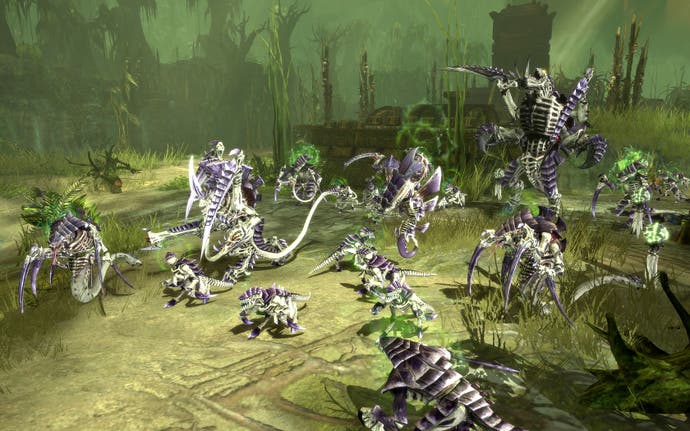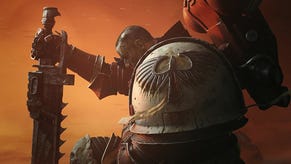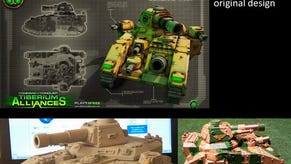Warhammer 40,000: Dawn of War II
Powerfist of Charisma +2.
Yes, Relic's combat visuals have never been finer. From the moment a space marine drop-pod smacks into the earth you're treated to a carnival of thundering ordnance and bursting viscera. There are times when half the screen seems swathed in smoke and flying debris. Effects like those for the artillery strikes and heavy automatic weapons are scintillatingly violent, and they really do seem to sell the battles to you each time.
This visual fidelity stretches out into the entire game. The environments are brilliantly crafted, down the details of murkier, spore-ridden atmospherics where the Tyranids have taken hold of entire planets. Relic is fluent in Warhammer's operatic space hobby, and from menu screens to maps, to the awesome mini-cut-scenes between key missions, it's exquisite. No game has wrapped up and delivered the 40k universe in such robust and cogent packaging. The campaign story itself is pretty good, and the non-linear way that it allows you to hop between worlds - and missions - spices things up by providing a modicum of choice. You can decide where to take your team, and whether you'll be fighting Orks, Tyranids, or Eldar. All this dissolves a bit towards the end of the campaign - which is arguably too short - but it definitely seems like a worthy direction for the series.
However, there is a problem with all this, and it's down to the way that single-player missions play out. They're not all that tactically interesting. There's only one real tactic to speak of, and the moment-to-moment engagements never really stretch you once this has been mastered. It's as if the levelling up and other RPG progress stuff has somehow replaced the need for the RTS campaign to make you adapt. Once I'd perfected my squad movements, I seldom changed how they fought. I occasionally messed with their equipment, but the end result was the same because the objectives of the missions (to capture or defend a point, or to kill a boss) never really threw any spanners in the works.
The tactical escalation is so limited compared to other base-free RTS games, and there's really not much novelty after the first dozen missions. What other games with similar aims have done in the past is to force you to adapt by making a particular conceit impossible - blocking your artillery when you've come to rely on it, or out melee-fighting you when that's become your thing. There's really very little of that kind of wrong-footing here, and as a consequence the campaign becomes rather uninteresting towards the end, despite some incredibly dramatic scripted sequences, reveals, and boss battles.
The multiplayer/skirmish, although better off in many ways than the single-player, suffers from some similar problems. Although there are bases from which units are spawned, the classical base-building joys have been surgically removed, leaving a pure combat model. This is simultaneously incredibly playable, and nevertheless lacking. Fighting real human opponents is vital, of course, because of their unpredictability, but even they can't make up for that lack of building-up-tech-tree tactical depth.
I couldn't help feeling that even in this all-options-open version of the game, that the new approach had lost much of what made the original game so compelling. Fortunately there's loads of master, as the multiplayer side of the game is where you get to play with the other races. The Eldar and orks are rather familiar, while the Tyranids are all-new for Dawn of War II. They were worth waiting for too, as their 'orrible biologic units are great fun to play, and even more fun to fight against.

What all this amounts to is a game that is bold, beautiful, and absurdly well-made. The production values are nothing less than stratospheric and - despite the inclusion of the deeply unlikeable Games For Windows Live - almost everything in Dawn of War II reeks of design talent light-years beyond those of most other developers.
It doesn't, however, fulfil the task of being absurdly entertaining. The failings in the campaign mean that for all its incredible fireworks and visual splendour, its not interesting enough. The fact that "Diablo With Squads" feels so natural, and makes so much sense when you're playing it, means that Relic is on the right track. It just hasn't made the vibrant campaign, nor the compulsive multiplayer game, that lives up to the idea it's conjured so colourfully.






